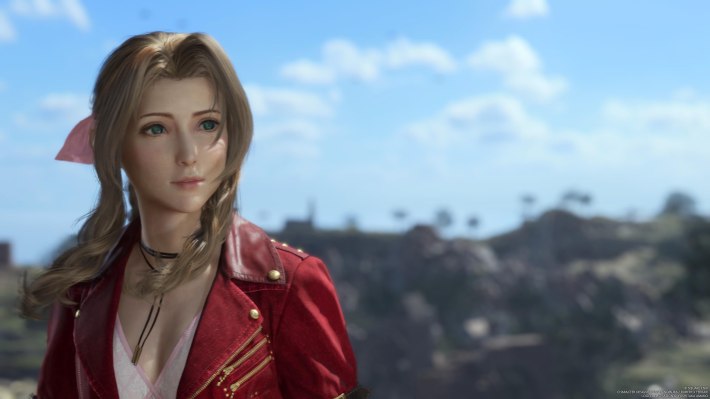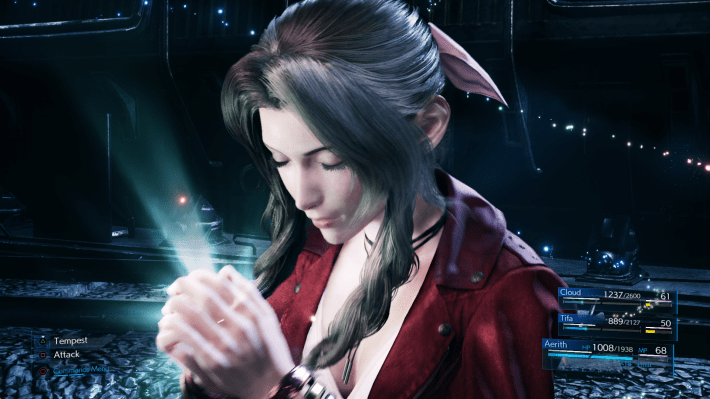I want to make it clear that this is one of the dumber things that has ever happened to me, and that it also happened when I was sixteen. Loath as I am to re-enter the personal essay industrial complex, with the release and overwhelming success of Final Fantasy VII: Remake and Rebirth, the time has come to air the resentment that I’ve been holding onto since I was a teenager.
Let me set the scene: I’m at a birthday party in my hometown. I never had many friends growing up, so outings like this were a treat. Due to circumstances that are too complicated to explain, I knew a surplus of people who knew how to make balloon animals, and I end up getting into a balloon-sword fight with a guy I think is cute. He’s the birthday girl’s cousin, and she tells me to go for it. I’ve only had one boyfriend before and I’m desperate for affection, so I do.
I don’t remember this guy’s name anymore, but that isn’t really important. After the party, we continue to hang out, listening to The Used in his car on the way to chill at the mall, coffee shops, his house. What is important to understand is that I haven’t played Final Fantasy VII, and he has built his entire teenage personality around Final Fantasy VII. It is his favorite video game. He has bleached blond hair styled like Cloud Strife. The first time we hang out at his place, he shows me Final Fantasy VII: Advent Children. I have no idea what’s going on in that movie, which I attribute to equal parts not having played the game it is a sequel to and the fact that we were making out the whole time.

Our brief courtship is interrupted by the fact that I get accepted into a summer arts program that requires me to stay in a dorm for four weeks. They don’t allow visitors. I try to keep up with him over text, and he tells me about his Advent Children cosplay. He cosplays Cloud Strife at the local convention that was the meeting grounds for the various groups of nerds in my home state (he showed me some pictures–they were really cool). On the one day where you can bring one guest to visit, he declines, saying he has to work on his buster sword. A lot of the people in the arts program I’m attending make fun of him for this when I tell them. Unfortunately, I have already started on my maladaptive coping mechanism for my loneliness and depression: giving people who don’t deserve it too many chances. We continue our awkward courtship. He sends me nudes constantly.
I don’t remember if I’m still at camp or not when he calls me to suddenly end things. I know it must have happened after the yearly anime convention that summer. On the phone call, he explains that while he was in his Cloud Strife cosplay, he met an Aerith cosplayer handing out flowers. They recreated the scene where Cloud and Aerith meet in the game, and then hung out all weekend. After three days of seeing her at the convention, he’s decided that he wants to date her. She lives out of state, but she agreed to date long distance.
In his explanation, he compares me to Tifa, Cloud’s childhood friend who is also in love with him. Being drawn into his bizarre fantasy like this, as a romantic rival in a drama where he is the main character, disgusts me.
I am now thirty four years old, and I want to emphasize that I feel that it is a personal failing that I can’t let go of this. My husband, who is wonderful, played Final Fantasy VII when it came out, and I’ve tried to enjoy it through his enthusiasm, but there’s still a barrier between myself and the game. I can’t disappear into it. I see Cloud and Aerith and I remember how lonely I felt, rejected in favor of some girl who didn’t even live in the same state. I’m not mad at him per se, but the pain still feels acute. He didn’t want me. He wanted a video game woman more than he wanted me. The same video game woman who, for years, has been held up as the ideal female character in a game often considered the best video game of all time. It’s a game that has changed a lot of people’s lives. It changed my life too, in a small way: it made it slightly worse.

Fandom is very fun, but it is also a nightmare. When I was still deep in the culture of livejournal, an observer of culture rather than a maker of it, people sometimes talked about the mental illness soup that often precedes an extreme investment into specific pieces of media. I know that I pick up new hyperfixations when I’m feeling particularly low. Recently, as I started having issues with my back, I got really obsessed with k-pop music (stan P1harmony). It’s fun to get excited about something, especially as a counterbalance to the things in one’s life that are more bleak.
Of course, over-identifying with a piece of media, leaning on it too much, isn’t a great coping mechanism. Final Fantasy fans certainly love Final Fantasy—to the point that someone used the contact form on my personal website to tell me to kill myself for criticizing Final Fantasy XVI. There is a point where the thing you like supplants your common sense, or at least your sense of scale and proportionality. If you’re basically in love with Aerith and spend as much time as possible surrounding yourself with iconography from Final Fantasy VII, dating someone who can also act out the game with you might seem totally rational. But that’s not really a relationship with another person—that’s just your fandom for Final Fantasy VII projected outward at a woman.
I don’t know what happened to that guy, and I’m not really angry at him. It’s more that I’m protective of my former self, the younger me who felt hated by everyone. I’m doing my own form of overidentifying with a media property here, and I know it. If I can continue to reject Final Fantasy VII, if I’m dismissive of it, then being the Tifa to someone’s Aerith can’t hurt me. It helps that I’ve learned that Tifa is extremely cool—I don’t mind being the really hot girl who can kick ass and is alive by the end of the game.
There’s another, deeper projection going on here that I only really realized once I sat down to write this essay. Growing up, I had a friend I met in pre-school named Matt Christopher. We lived around the corner from each other and went to school together for many years. He was a very close friend, one of the few who I always felt would have my back. When I was a preteen, before I met the guy who thought he was Cloud Strife and that I was Tifa, Matt played Final Fantasy VII. He loved it so much that he came over to my house so I could play his copy, and we visited Midgar together.

We sat on the floor of my parents living room for hours, Matt guiding me gently through its opening set pieces. I never made it far into the game without him—it’s not like we could have played the whole game that night—but I remember his eyes glittering with excitement. He was so eager to show me what he saw. Playing with him, the world seemed so beautiful and real.
In the first week of my freshman year of college, he died of a heroin overdose. I loved him deeply, and I miss him a lot, even now. Like a lot of memories of Matt, I have tried not to think about our time playing Final Fantasy together. I can never go back to Midgar without him, I don’t think.
In talking to my good friend Maddy Myers, I’ve learned a lot about Cloud. He’s insecure, he’s traumatized, he’s ashamed of his inability to protect his friends, he’s trying on a whole new identity because he hates himself so much. In my teenage years, I was a lot like Cloud, more like him than Aerith or Tifa. Final Fantasy VII pivots on that fulcrum of teenage angst, expressions of pain that I’ve tried to leave behind. It is also now an object that is too painful for me to think about too hard. There’s too much love there, and too much sadness.
Inside Baseball is a week of stories about the lesser-known parts of game development, the ins and outs of games journalism, and a peek behind the curtain at Aftermath. It's part of our first subscription drive, which you can learn more about here. If you like what you see, please consider subscribing!


